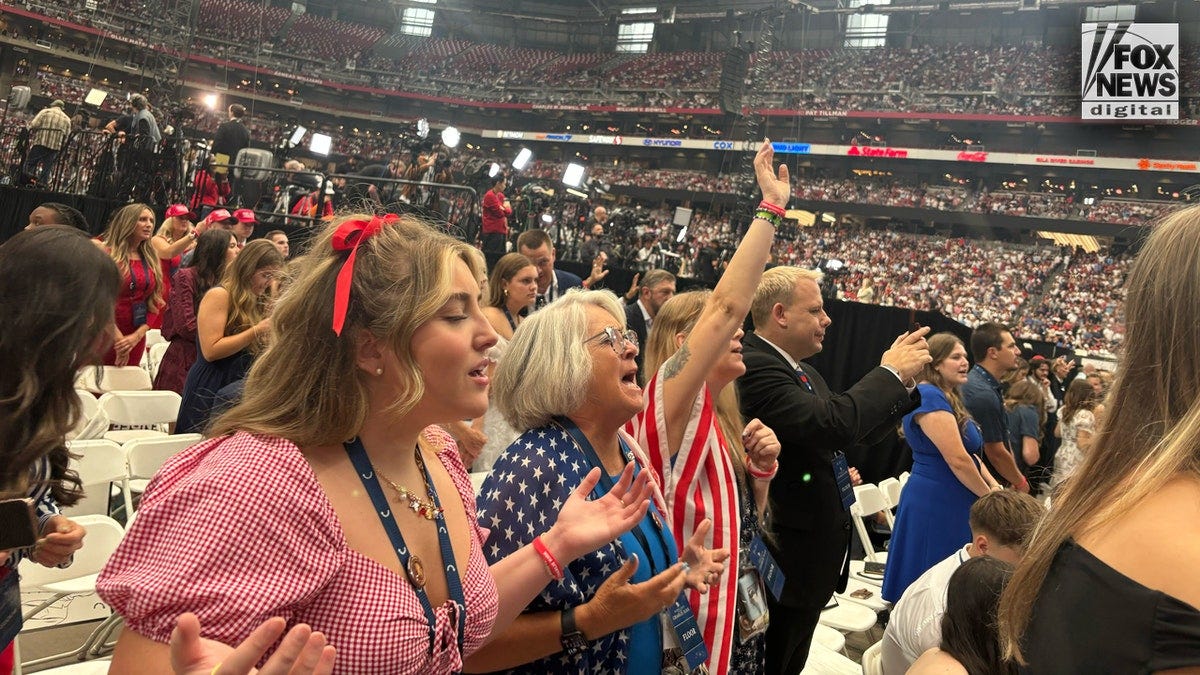Curious Reads: Who is Using Whom?
Worship at Charlie Kirk's Memorial was just One More Capitulation of the Evangelical Church to the GOP
Hello friend, Liz here.
This week, I’m delighted to bring you an essay from a writing pal, Kelsey Kramer McGinnis. I know you couldn’t possibly be sick of hearing about Charlie Kirk LOL… but she has written an interesting take on his memorial service. For example, have you wondered which musicians headlined Kirk’s arena memorial? They included some of white American evangelicalism’s most popular worship leaders.
As a musicologist, this is Kelsey’s wheelhouse, so I wanted her to take on the question of worship music at the memorial head-on. Because I bet your relatives are still thinking and talking about it like mine are. (Or would be, if they let me talk politics with them! That’s an essay for another time.)
In the meantime, I hope, like always, that you know that you’re not alone in this fight against Christian Nationalism. It is heresy, and Charlie Kirk’s memorial was just one more time the American evangelical church demonstrated its hypocrisy and capitulated to Donald Trump. And it’s still not okay with me.
Take care of yourself, my friends.
Thanks for reading.
Warmly, Liz Charlotte Grant
Worship Music is Not Political—or at least it shouldn’t be.
Who were the worship leaders who performed at Charlie Kirk’s memorial? And what did they compromise to be there?
Halfway through the televised memorial for Charlie Kirk, worship artist Cody Carnes stepped up to the microphone, Bible-in-hand, and began to invite the massive crowd of 90,000 to worship. He started to speak about the song they were about to lead, saying, “There’s hope in Jesus, Amen?” He continued, but then stopped mid-sentence. His wife, fellow worship artist Kari Jobe, walked over to nudge him and whisper something off-mic.
They were realizing that, as they were inviting the room to sing along, President Trump was looking out from his plexiglass-enclosed box, pumping his fist, revving up the crowd, and they were starting to chant—“USA! USA!”—in his honor. Carnes let the moment pass before beginning again.
After the crowd’s chanting died down, Carnes read from John 1, and told the audience that “The Blessing” had been one of Charlie’s favorite songs. On the stage leading the song were Carnes, Jobe, Chris Tomlin, Tiffany Hudson, Brandon Lake, and Phil Wickham. That roster represents almost all of the major players in the contemporary worship music industry, a web of collaborators and recording artists that produces the most popular songs used by thousands of American churches in their services.
The moment when Carnes had to pause and wait stood out to me as I watched the event. It illustrated the compromised position of worship leaders who consent to lend their voices and spiritual authority to political causes.
We all watched in real time as worship leaders deferred to the president of the United States, who had captured the crowd’s attention and enthusiasm, usurping a moment of reverence and grief with political fervor.
In some evangelical circles—especially in those where charismatic influence has grown—there is a belief that Christians can and should take advantage of mass media to evangelize, and that they can “hack” existing platforms or outlets for the gospel. Many watching and participating in the Kirk memorial likely celebrated as they perceived that Christians were capitalizing on an opportunity to share the gospel in front of the largest audience in a generation (Billy Graham similarly saw mass media as a tool for evangelism and wielded it to reach millions). Savvy Christians were taking advantage of the moment.
But as I watched, I wondered, who is using whom?
I was 14 years old the first time I tearfully sang “How Great is Our God” along with Chris Tomlin, lost in a sea of people in a darkened auditorium in Salt Lake City in 2006, where I’d attended a conference for evangelical teens called “Challenge.” That event baptized me into the world of arena worship, and I loved it.
So I understand why people showed up and tuned in to Kirk’s memorial and thought, “This is revival.” When 90,000 people unify in song to worship God, whatever the venue or reason for gathering, God must be doing something big there, right?
Community music-making on its own is a powerful force for building unity among a group of people—within religious communities and without. When you combine that with the spiritual earnestness and devotion of a religious group, you have a potent cocktail of associations, beliefs, and experiences.
You may not get the same emotional intensity from a crowd singing “Sweet Caroline” at a baseball game, but people who would normally never sing in a group stand up and shout the lyrics. And it’s those little moments of unity and camaraderie that make in-person baseball games more than just athletic competition.
Turning Point USA is a hybrid political organization and a para-church ministry. Arena worship, like at Kirk’s memorial, attracts people to the community. The memorial event effectively packaged and broadcast an experience of community that outsiders to evangelical Christianity find attractive, mobilizing that fervor for the sake of a political cause.
As a conservative teenager who sang tearfully with Chris Tomlin and marched in parades with local Republican political campaigns (some campaigners were my family members), I also longed for the kind of community that coalesced around these high-intensity, value-driven movements and organizations.
If I loved God, I was told to act out my faith, preferably as a Republican.
I’m not accusing these artists of platform-seeking and grifting–though the contemporary worship music industry has become intertwined with the entertainment industry in ways that introduce potentially troubling financial wrinkles. (It doesn’t help their case that, as Sojourners’ Darren Saint-Ulysse put it, their songs received a “Superbowl” type bump, pushing the songs of these worship leaders into the top 40 on the iTunes charts, where they have remained.)
But political actors are proving that they have learned how to borrow the faith and community-building power that they see offered by musical worship–without centering God.
Carnes and Jobe have appeared in the Trump White House before. Of that opportunity, when Carnes and Jobe accepted a summon to Trump’s Oval Office, Carnes told RELEVANT,
“Man, I don’t care whose administration it is. If that invitation comes across our table, that we get to go into that house and lift up the name of Jesus and invite the presence of God into that house? … It was just to honor God in the way that we were getting invited to and we were just doing our best to do that.”
Lake explained his presence at Kirk’s Memorial like this:
“This wasn’t a political stunt. This was not saying I’m siding with anyone, other than, we were going to go minister to a widow who’d just lost her husband, who was a man of faith, and we wanted to honor their family. And I thought it was so amazing that she was like, ‘I want worship to set the tone. I want worship to lead the way as we celebrate his life.’”
And we can let Chris Tomlin explain for himself why he accepted the invitation:
Taking them at their word, my most generous read is that these worship artists said “yes” to the Kirk memorial because they saw it as an evangelistic opportunity. Yet for a day, these musicians lent the power of what they do to a political movement, in an environment where worship defers to politics. It’s an “away” game.
And we cannot separate our faith from the place where we practice it.
Attendees showed up at Charlie Kirk’s rally ready to worship something. The desire to experience the connection, the collective effervescence, the divine is, I think, something to take seriously.
I just wonder, who were they worshipping?
About the Author
Kelsey Kramer McGinnis is a writer, musicologist, and educator based in Iowa. She holds a PhD from the University of Iowa.
Kelsey is a regular contributor to Christianity Today, where she writes and reports on worship practices, the music industry, and church culture. She is also an adjunct professor at Grand View University in Des Moines, where she teaches music, theology, and social justice.
She is the co-author of the forthcoming book, The Myth of Good Christian Parenting: How False Promises Failed a Generation of Evangelicals (Brazos press, October 2025), which releases next Tuesday!








